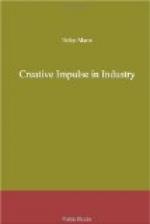It is almost axiomatic to say that a system of wealth production which cultivated creative effort would yield more in general terms of life as well as in terms of goods, than a system like our own which exploits creative power. It is obvious that the disintegrating tendency in our system is due to the fact that production is dependent for its motive force on the desire to possess. It is also obvious that a rational system of industry which sought to give that desire among all men full opportunity for satisfaction would also undertake to cultivate the creative impulse for the sake of increasing creative effort The result would be an increase in production. As logical as this observation may be, it is not so obvious how such a social transformation as this implies, may be effected.
Every advance in wealth creation which has become an institutional part of an economic system has been impelled and sustained by the material interests of people who at the time held the strategic position in the community. The world has progressed, or retrogressed, as the most powerful interests at any time adjusted the institutions and customs governing wealth production to their own advantage. As the controlling interests in our present scheme are the business interests, it is the business man, not the workman, who directs industry and determines its policy as well as the general policy of the nation in which it operates. It is to the advantage of private business run for private gain, to control creative effort for the purpose of appropriating the product, and to inhibit free creative expression as an uncontrollable factor in the enterprise of exploitation.
The appalling and wanton sacrifice of life which are incident to the evolution of machinery and the division of labor seem to demand at times their elimination. In weariness we are urged to retrace our steps and go back to craftsmanship and the Guilds. But it is idle to talk about going back or eliminating institutionalized features of society. We cannot go back, we have not the ability to discard this or that part of our environment except as we make it over. The result of this making over might be vitalized by methods which had belonged to earlier periods, but neither the methods nor the periods, we can safely say, will live again. Neither our own nor future generations will escape the influence of modern technology. It will play its part. It may be a part which will lead away from some of the destructive influences which developed in the era of craftsmanship and which dominate the present. But a society too enfeebled to use its own experience will not have the power to use the experience of another people or of another time. It is beside the point to look to some other experience or scheme of life and choose that because it seems good, unless the choice is based on a people’s present fitness to adapt that other experience or other scheme of life to their own experience. The proposition to revert to an earlier period suggests nothing more than the repetition of an experience out of which the present state of affairs has evolved.




